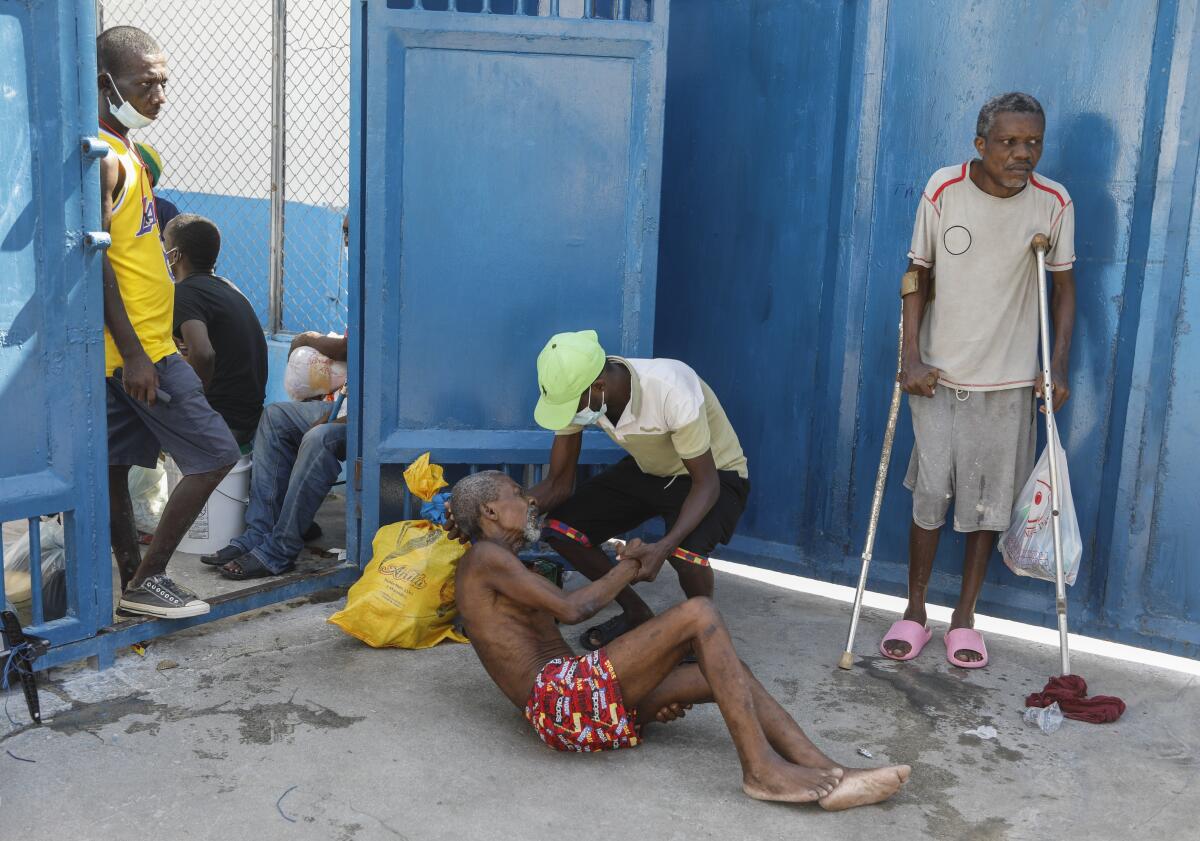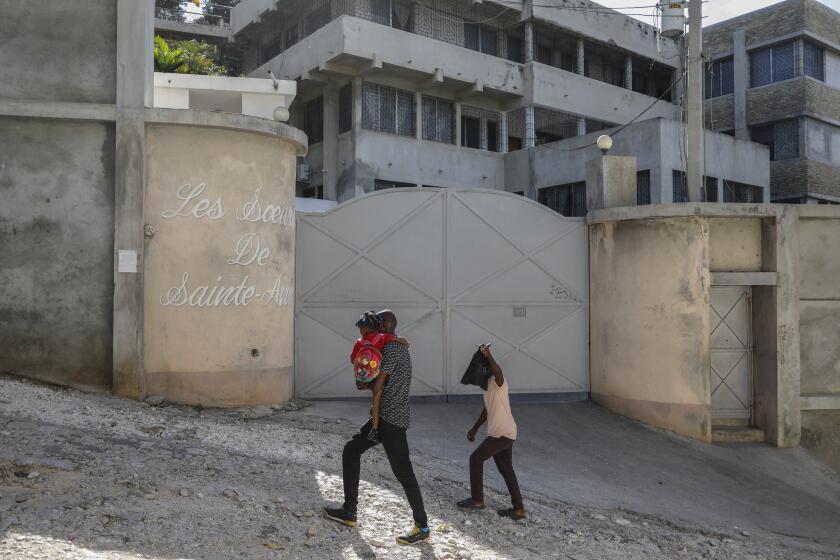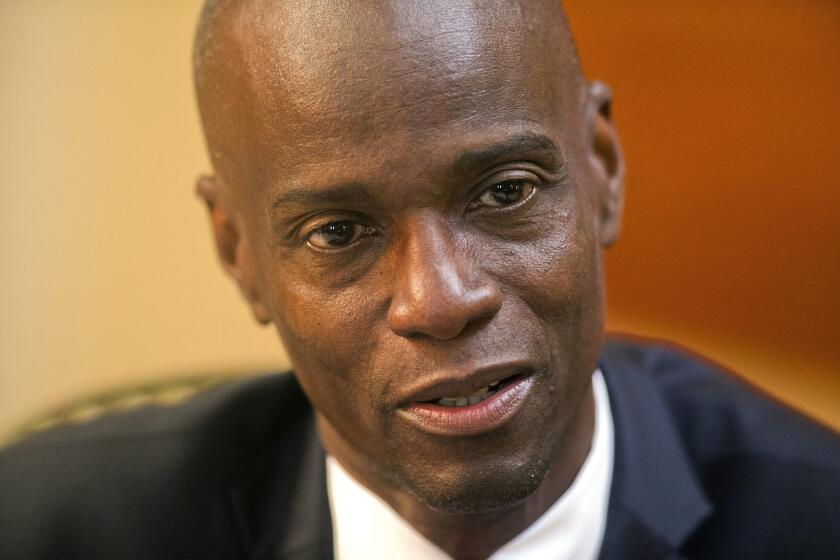Haiti orders curfew after gangs overrun its two largest prisons, free thousands of inmates

- Share via
PORT-AU-PRINCE, Haiti — Authorities in Haiti have ordered a nighttime curfew after an explosion of violence in which gang gunmen overran the two biggest prisons and freed thousands of inmates over the weekend.
A 72-hour state of emergency began Sunday night. The government said it would set out to find the killers, kidnappers and other criminals who fled.
“The police were ordered to use all legal means at their disposal to enforce the curfew and apprehend all offenders,” said a statement from Finance Minister Patrick Boivert, the acting prime minister.
Gangs already were estimated to control up to 80% of Port-au-Prince, the capital. They are increasingly coordinating their actions and choosing once unthinkable targets like the Central Bank.
Prime Minister Ariel Henry traveled abroad last week to try to salvage support for a United Nations-backed security force to help stabilize Haiti in its conflict with the increasingly powerful crime groups.
The archbishop of Port-au-Prince in Haiti says six nuns and two other people who were kidnapped while riding a bus last week have been released.
Haiti’s National Police has roughly 9,000 officers to provide security for more than 11 million people, according to the U.N. They are routinely overwhelmed and outgunned.
The deadly weekend marked a new low in Haiti’s spiral of violence. At least nine people had been killed since Thursday — four of them police officers — as gangs stepped up coordinated attacks on state institutions in Port-au-Prince, including the international airport and national soccer stadium.
But the attack on the National Penitentiary late Saturday shocked Haitians who are accustomed to living under the constant threat of violence.
Almost all of the estimated 4,000 inmates escaped. Three bodies with gunshot wounds lay at the prison entrance Sunday.
In another neighborhood, the bloodied corpses of two men with their hands tied behind their backs lay face-down as residents walked past roadblocks set up with burning tires.
Among the few dozen people who chose to stay in prison are 18 former Colombian soldiers accused of working as mercenaries in the July 2021 assassination of Haitian President Jovenel Moïse.
Widow, ex-prime minister and former police chief indicted in 2021 assassination of Haiti’s president
A judge in Haiti investigating the 2021 killing of President Jovenel Moise indicted his widow, an ex-prime minister and the former national police chief.
“Please, please help us,” one of the men, Francisco Uribe, said in a message widely shared on social media. “They are massacring people indiscriminately inside the cells.”
Colombia’s foreign ministry has called on Haiti to provide “special protection” for the men.
A second Port-au-Prince prison containing around 1,400 inmates was also overrun.
Gunfire was reported in several neighborhoods in the capital. Internet service for many residents was down as Haiti’s top mobile network said a fiber optic cable connection was slashed during the rampage.
After gangs opened fire at Haiti’s international airport last week, the U.S. Embassy said it was halting all official travel to the country. On Sunday night, it urged all American citizens to depart as soon as possible.
The Biden administration, which has refused to commit troops to any multinational force for Haiti while offering money and logistical support, said it was monitoring the rapidly deteriorating security situation with grave concern.
The leader of one of Ecuador’s most dangerous gangs was discovered missing from the prison cell where he was serving a sentence for drug trafficking.
The surge in attacks follows violent protests that turned deadlier in recent days as the prime minister went to Kenya seeking to move ahead on the proposed U.N.-backed security mission, to be led by that East African country.
Henry took over as prime minister following Moise’s assassination and has postponed plans to hold parliamentary and presidential elections, which haven’t happened in almost a decade.
Jimmy Chérizier, a former elite police officer known as Barbecue who now runs a gang federation, has claimed responsibility for the surge in attacks. He said the goal is to capture Haiti’s police chief and government ministers and prevent Henry’s return.
The prime minister, a neurosurgeon, has shrugged off calls for his resignation and didn’t comment when asked if he felt it was safe to come home.
Sanon and Luxama write for the Associated Press. AP reporters Joshua Goodman in Miami and Danica Coto in San Juan, Puerto Rico, contributed to this report.
More to Read
Sign up for Essential California
The most important California stories and recommendations in your inbox every morning.
You may occasionally receive promotional content from the Los Angeles Times.
















